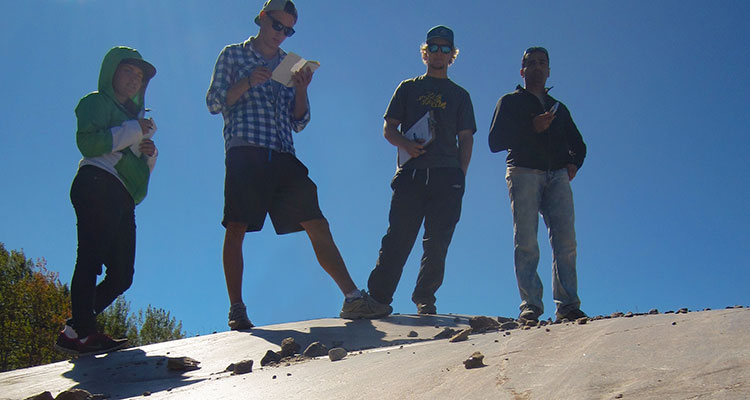
If you are curious or concerned about climate change, pollution, resource depletion and degradation, loss of biodiversity, invasive species, or conservation of natural habitats, our Environmental programs offer you exciting study and career opportunities.
Environmental Science students apply tools and principles from biology, chemistry, physics, geology, geography, hydrology, climatology, and geographic information systems (GIS), among others, to characterize and analyze how the physical and living environment functions and how it is affected by human activities.
Environmental Studies students connect the tools and principles of environmental science with principles from social science, arts, and humanities to characterize and analyze complex human-environment interactions and formulate effective ethical, political, and social strategies to address human impacts.
Our comprehensive, integrated, systems-based approach combines classroom, laboratory, and field studies to provide you with the knowledge and skills necessary to guide sustainable development and use of precious Earth resources and to mitigate human-induced environmental impact and change.
Environmental Science
The Great Lakes watershed hosts the largest freshwater resource in the world. The University of Windsor is located at its heart—an unequaled natural laboratory to study the environment and develop solutions to important environmental issues, on both global and local levels.
Our classes provide you with a comprehensive learning experience, incorporating all major components of the physical and living environment—geosphere, hydrosphere, atmosphere and biosphere.
During your first two years of study, you will receive grounding in scientific principles pertaining to environmental systems and natural processes, as well as human influences and interactions. This includes hands-on experience in fieldwork, laboratories, and computer visualization.
Third- and fourth-year courses focus on such complex and evolving issues as environmental impact and assessment, sustainable resource use and management, climate change mitigation, and ecosystem health.
The flexibility of our curriculum allows you to specialize in aspects of the environment that might be of particular interest to you, such as environmental chemistry, hydrogeology, and climatology.
Required courses in scientific writing and field methods provide you with practical knowledge and essential skills.
In addition, with appropriate course selection, you can obtain knowledge requirements for various professional certifications or accreditations, such as ECO Canada and APGO (Association of Professional Geoscientists of Ontario).
Options for obtaining program minors in Earth Science or Geography, as well as a geography teachable subject, are also available. If you are interested in graduate study, we encourage you to undertake a thesis project during the fourth year of the program.
Our faculty members include internationally renowned scientists with active research programs in a variety of natural resource and environmental areas. Many faculty members also maintain appointment in the Great Lakes Institute for Environmental Research (GLIER). Students are often invited by faculty to become directly involved in these research programs through Outstanding Scholar placements, employment, internships, volunteer opportunities, or thesis studies.
In addition to a rewarding career as a scientist, an Environmental Science degree can provide appropriate background training for professions such as law, medicine, or business—combinations that are extremely attractive to employers, such as consulting companies, regulators, and litigators.
Student Resources
State-of-the-art laboratory, field, and computer equipment are used throughout the Environmental Science program. Dedicated classrooms and laboratories provide students with opportunities for training in GIS, remote sensing, assessment and analysis, environmental chemistry, and environmental physics.
The Resource Centre, open to all of our students, is staffed by graduate and senior undergraduate students who can provide assistance with course-related questions.
Career Paths
- Resource and manufacturing industries (permitting, monitoring, compliance, remediation)
- Government sector (regulation, monitoring, enforcement)
- Consulting companies
- Management and conservation
- Education (with additional studies)
- Law (with additional studies)
- Research
Admission Requirements
The OSS Diploma and six Grade 12 U or M courses, including ENG4U, are required. MHF4U, SCH4U and SBI4U required. SPH4U and MCV4U are recommended.


